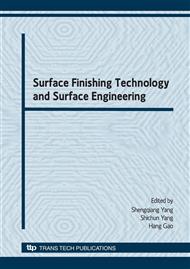p.285
p.293
p.299
p.305
p.311
p.319
p.325
p.331
p.337
Surface Integrity Induced by Abrasive Machining Sapphire Wafer
Abstract:
Surface integrity of Sapphire wafer is the frontier technology to grow high quality AlN/GaN films for high brightness light-emitting diode. Surface damage measurement methods for single crystal sapphire were introduced firstly. Classical types of surface deformation induced by abrasive machining, such as lattice deformation, strain, scratch, crack versus abrasive grits and chemical reaction were compared. With the development of modern grinding technology, depth of the damaged surface layer decreases from 10μm to 2μm or much less. Both crack, lattice deformation, twinning and strain were detected along the ground surface, only dislocation and strain were appeared for polished sapphire surface. Usually, depth of the damaged layer was less than 300nm using mechanical polishing process. Chemical mechanical polishing achieved the lowest depth of the damaged surface and best surface roughness, scratch depth was used to descript the damaged depth, which is about 1 nm, and so called no damage to the layer remains during chemical mechanical polishing process.
Info:
Periodical:
Pages:
311-316
Citation:
Online since:
July 2008
Authors:
Keywords:
Price:
Сopyright:
© 2008 Trans Tech Publications Ltd. All Rights Reserved
Share:
Citation:


